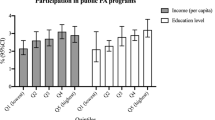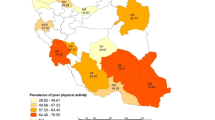Abstract
Many results of empirical studies suggest that people who actively engage in physical activities are more likely to show better health status and well-being. Household income is also an important factor in determining the level of a person’s health because lower income often acts as a barrier in accessing resources that enhance health. Nevertheless, some recent studies have revealed that not only low income, but also lack of time used for family life will engender higher risks of illness, partly because the probability of participating in physical activities, such as sports decreases. This study specifically examined relations between income and time poverty, and daily health-related activities including physical activities and poor health habits. We used a nationwide internet household survey in Japan conducted in 2012 with 6491 respondents aged 20–79 (80.5% response rate), sponsored by the Japan Society for the Promotion of Science (JSPS). From the estimation results obtained using econometric models, we observed that time poverty at a household level was highly associated with short-duration sleeping of the household member. Indeed, we observed different results for women and men. For men, individuals who fell into the lack of living time category might be prevented from actively engaging in sports, while getting less sleep. For women, both income and time poverty tended to depend on alcohol consumption behavior. We point out that government must increase policy support for households who confront difficult circumstances of time poverty and income poverty.
Similar content being viewed by others
Notes
Vickery (1977) used 10.2 h per day, the average time spent by adults for basic activities, based on the 1966 Michigan Time Use Survey of the United States. Harvey and Mukhopadhyay (2007) used 10.5 h per day, the average time spent by adults for basic activities calculated from similar survey data of Canada.
Yagi et al. (2016) used the same survey for the study on the relations between happiness and employment status.
References
Aue, K., Roosen, J., & Jensen, H. H. (2016). Poverty dynamics in Germany: Evidence on the relationship between persistent poverty and health behavior. Social Science and Medicine, 153, 62–70. https://doi.org/10.1016/j.socscimed.2016.01.040.
Balboa-Castilo, T., León-Muñoz, L. M., Graciani, A., Rodríquez-Artalejo, F., & Guallar-Castillón, P. (2011). Longitudinal association of physical activity and sedentary behavior during leisure time with health-related quality of life in community-dwelling older adults. Health and Quality of Life Outcomes, 47(9), 1–10. https://doi.org/10.1186/1477-7525-9-47.
Bise, R., Jeffrey, A., & Ronald, C. (2007). Physical activity level and health-related quality of life in general adult population: A systematic review. Preventive Medicine, 45, 401–415. https://doi.org/10.1016/j.ypmed.2007.07.017.
Bittman, M. (2002). Social participation and family welfare: The money and time costs of leisure in Australia. Social Policy and Administration, 36, 408–425. https://doi.org/10.1111/1467-9515.t01-1-00262.
Breuer, C., Hallmann, K., Wicker, P., & Feiler, S. (2010). Socio-economic patterns of sport demand and ageing. European Review of Aging and Physical Activity, 7(2), 61–70. https://doi.org/10.1007/s11556-010-0066-5.
Brown, H., & Roberts, J. (2011). Exercising choice: The economic determinants of physical activity behavior of an employed population. Social Science and Medicine, 73, 383–390. https://doi.org/10.1016/j.socscimed.2011.06.001.
Burchardt, T. (2010). Time, income and substantive freedom: A capability approach. Time and Society, 19(3), 318–344.
Douthitt, R. A. (2000). Time to do the chores?’ Factoring home-production needs into measure of poverty. Journal of Family and Economic Issues, 21(1), 7–22. https://doi.org/10.1023/A:1009423329532.
Fujimura, H. (2012). Japan’s labor unions: Past, present, future. Japan Labor Review, 9(1), 6–24.
Galan, I., Boix, R., Medrano, M. J., Ramos, P., Rivera, F., Pastor-Barriuso, R., et al. (2013). Physical activity and self-reported health status among adolescents: A cross-sectional population-based study. British Medical Journal, 3, 1–10.
Harvey, A., & Mukhopadhyay, A. K. (2007). When twenty-four hours is insufficient: Time poverty of working parents. Social Indicators Research, 82, 57–77. https://doi.org/10.1007/s11205-006-9002-5.
Hyytinen, A., & Lahtonen, J. (2013). The effect of physical activity on long-term income. Social Science & Medicine, 96, 129–137. https://doi.org/10.1016/j.socscimed.2013.07.019.
Ishii, K., & Urakawa, K. (2014). Time-adjusted poverty among working households in Japan: Two-dimensional poverty line approach. MITA Business Review, 57(4), 97–121. (in Japanese).
Kalenkoski, C. M., & Hamrick, K. S. (2013). How does time poverty affect behavior? A look at eating and physical activity. Applied Economic Perspectives and Policy, 35(1), 89–105. https://doi.org/10.1093/aepp/pps034.
Kalenkoski, C. M., Hamrick, K. S., & Andrews, M. (2011). Time poverty thresholds and rates for the US population. Social Indicators Research, 104, 129–155. https://doi.org/10.1007/s11205-010-9732-2.
McCann, B. (2006). Making physical activity research relevant to policy makers. Journal of Physical Activity and Health, Suppl 1, S267–S272.
OECD. (2011). How’s life?—Measuring Well-being. Paris: OECD Publishing.
OECD. (2018). Labor force statistics. Paris: OECD Publishing.
Oshio, T., & Kan, M. (2014). Multidimensional poverty and health: Evidence from a nationwide survey in Japan. International Journal for Equity in Health, 128(13), 1–11. https://doi.org/10.1186/s12939-014-0128-9.
Spinney, J., & Millward, H. (2010). Time and money: A new look at poverty and the barriers to physical activity in Canada. Social Indicators Research, 99, 341–356. https://doi.org/10.1007/s11205-010-9585-8.
Urakawa, K. (2018). Time poverty of the working generation. Social Policy and Labor Studies, 10(1), 25–45. (in Japanese).
Vickery, C. (1977). The time-poor: A new look at poverty. Journal of Human Resources, 12(1), 27–48. https://doi.org/10.2307/145597.
Wada, K., Eguchi, H., Yoneoka, D., Okahisa, J., & Smith, D. R. (2015). Associations between psychological distress and the most concerning present personal problems among working-age men in Japan. BMC Public Health, 15, 305. https://doi.org/10.1186/s12889-015-1676-7.
Yagi, T., Urakawa, K., & Yonezaki, K. (2016). Happiness and employment status. In T. Tachibanaki (Ed.), Advances in happiness research: A comparative perspective (creative economy). Berlin: Springer. https://doi.org/10.1007/978-4-431-55753-1_9
Funding
Funding was provided by Japan Society for the Promotion of Science (Grant No. 26380362).
Author information
Authors and Affiliations
Corresponding author
Ethics declarations
Conflict of interest
The authors declare that they have no conflict of interest in the report or the study it describes.
Ethical Approval
All procedures performed in studies involving human participants were in accordance with ethical rules by Japan Society for the Promotion of Science.
Informed Consent
Informed consent was obtained from all respondents to the survey in the study.
Additional information
Publisher's Note
Springer Nature remains neutral with regard to jurisdictional claims in published maps and institutional affiliations.
Rights and permissions
About this article
Cite this article
Urakawa, K., Wang, W. & Alam, M. Empirical Analysis of Time Poverty and Health-Related Activities in Japan. J Fam Econ Iss 41, 520–529 (2020). https://doi.org/10.1007/s10834-020-09671-2
Published:
Issue Date:
DOI: https://doi.org/10.1007/s10834-020-09671-2




